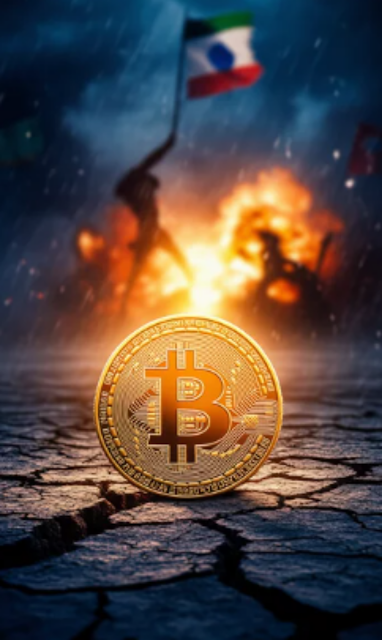I’ve got to be honest, I was glued to the news when Israel launched its attack on Iran. My first thought, as someone who watches markets, was, “Here we go again.” Typically, when things get this heated globally, capital flees to safety. For ages, that’s meant one thing: gold. But this time, something felt… different. I watched Bitcoin, and while it wobbled, it didn’t plummet. It held its ground surprisingly well, especially compared to the altcoin bloodbath. It got me thinking: Has the world, or at least a part of it, started seeing Bitcoin as a legitimate Bitcoin safe-haven? I wasn’t the only one; a lot of people were scratching their heads about this. 🤔
Market Jitters: What Really Happened? 📉
Let’s break it down. On April 13th, as the news of Israel’s strike broke, Bitcoin did dip. I was half-expecting it to crash through the $60k floor, but it never happened. It held steady. As you mentioned, altcoins got hammered, but because Bitcoin stood firm, they eventually started to creep back up.
But here’s the plot twist. While Bitcoin was holding its own, traditional safe havens like gold and crude oil did exactly what you’d expect them to do—they went up. So, does that mean Bitcoin isn’t a safe haven after all? Not so fast.
What’s really interesting is that major US stock indices like the Nasdaq and the S&P 500 also didn’t really tank. They saw a slight dip, sure, but nothing close to a “crash.” This suggests that Bitcoin’s resilience might have been tied to a broader sense of stability in the macroeconomic landscape. It seems like the big players weren’t hitting the panic button just yet, and Bitcoin was riding that wave of relative calm.
I noticed that too. Bitcoin’s price chart almost mirrored the Nasdaq’s. A quick, sharp dip followed by a swift recovery. It was as if the market collectively learned a lesson: major dips are now buying opportunities, not the start of a cataclysmic collapse.
This wasn’t always the case. When Russia invaded Ukraine back in 2022, Bitcoin plunged by about 10% and stayed down for quite a while. During the Hamas incident in October 2023, it dropped around 5% but bounced back much faster. This time, the dip was even shallower. Something has definitely changed in how the market perceives these events.
Immune to Bad News or Just Used to It? 🤷♂️
There’s a fascinating rule of thumb in the crypto world: “Bitcoin doesn’t get shocked by the same bad news twice.” Think about it. Years ago, a headline about quantum computers potentially breaking Bitcoin’s encryption would send the price into a nosedive. Now? Nobody even blinks when that news pops up.
So, maybe the story here isn’t that Bitcoin has achieved some mythical safe-haven status. Perhaps it’s simpler: the world is just becoming desensitized. We’ve seen so much conflict in the Middle East and Eastern Europe that another flare-up doesn’t rock the boat like it used to. Even oil prices, which experts expected to soar, stayed relatively contained. It’s like the world has collectively shrugged and said, “It’s the Middle East, what’s new?”
This desensitization seems to apply across the board, not just to Bitcoin. We’ve become accustomed to a certain level of global chaos.
A New Category: The “Geopolitical Asset” 🌍
For years, I’ve been saying that Bitcoin isn’t just a currency or an investment; it’s a geopolitical asset. Recently, even heavy-hitters like BlackRock’s CEO, Larry Fink, have started using similar language. This goes beyond the simple “safe haven” label.
What does that mean? Let me give you a powerful example. During the early days of the war in Ukraine, stories emerged of refugees crossing the border into Poland. They had to leave almost everything behind. Some even set fire to their own cars to prevent them from falling into enemy hands. But a few were able to carry their life savings with them because they had converted it to Bitcoin or Ethereum. That’s not just a store of value; that’s financial sovereignty in the face of total collapse.
If it’s such a powerful tool in a crisis, why didn’t the price explode? Why didn’t it rally hard? This is where understanding human psychology becomes absolutely critical.
When a real crisis hits, people don’t reach for the novel or the complex. They reach for what’s familiar. It’s a survival instinct. If war broke out here, what would people hoard? Not crypto wallets. They’d be lining up for US dollars, bottled water, and instant noodles. Those are the most familiar, most trusted assets in a moment of pure panic.
For most of the world, Bitcoin still isn’t “familiar.” The US dollar, however, is. And that’s why we saw a spike in the value of dollar-pegged stablecoins like Tether (USDT) in some markets. People sought the stability of the dollar, even in digital form, because it’s a known quantity.
The Great Divide: The People vs. The Powerful 🏦
This is the most important part of the puzzle. We have to separate how regular folks think from how institutions and the super-rich operate. For them, the game is completely different.
While the average person reaches for instant noodles, institutions and billionaires are starting to see Bitcoin as their version of a familiar, essential asset. For them, geopolitical chaos isn’t a threat; it’s an opportunity. The data proves it: during last week’s turmoil, Bitcoin ETFs saw net positive inflows. The big money wasn’t selling; they were calmly buying.
It reminds me of the old, probably apocryphal, story about the Rothschild family during the Napoleonic Wars. They got word of Napoleon’s defeat at Waterloo before anyone else and used that information to make a fortune on the London stock exchange while everyone else was panicking. The tools have changed, but the mindset of the ultra-wealthy hasn’t. They operate with a cold, calculated logic that is completely alien to most of us.
So, I’m going to make a bold prediction: the next time a major geopolitical crisis hits, Bitcoin won’t just hold steady. It will soar.
📋 Quick Summary
Global markets, including Bitcoin, are becoming less reactive to recurring geopolitical conflicts.
In a crisis, the general public flocks to familiar assets like cash and stablecoins, not yet Bitcoin.
Super-rich individuals and institutions see turmoil as a buying opportunity and are treating Bitcoin as a strategic asset.
For those needing to move wealth across borders and evade sovereign risk, Bitcoin is superior to both stablecoins and physical gold.
Bitcoin vs. Stablecoins: Understanding the Nuance ⚖️
Okay, so if the average person is running to stablecoins, are they the real answer? Yes and no. Stablecoins are great because they are easy to understand—one USDT is supposed to be one US dollar. This makes them a fantastic tool for people in countries with collapsing currencies, like Argentina or Turkey. It allows them to protect their wages from hyperinflation.
However, there’s a huge catch: stablecoins are not fully decentralized. Companies like Tether (for USDT) and Circle (for USDC) issue them. These are centralized companies that can be pressured, regulated, and sanctioned by governments, particularly the United States. If you’re a country on bad terms with the U.S., or a billionaire trying to move a billion dollars without setting off alarm bells, a USD-pegged stablecoin is a huge liability. Your assets could be frozen with a single court order.
This is where Bitcoin’s true power as a geopolitical asset shines. It answers to no one.
The Concept of a “Possessory Asset” 📝
To really get it, you need to understand the concept of a “possessory asset.” This is wealth you can hold and move yourself, without anyone’s permission. Think:
- Physical Gold Bars
- Diamonds
- A priceless painting like Van Gogh’s “Sunflowers”
For centuries, communities that have faced persecution and displacement, like Jewish people and overseas Chinese, have prized these assets. Why? Because when the government comes to seize your factory, your land, and your bank account, these are the things you can take with you. The painful history of the Holocaust, where the Nazis confiscated everything down to gold fillings, drove this point home. This history is why Jewish financiers pioneered modern bonds—a piece of paper representing debt that could be transferred, making the holder less of a target. Bitcoin is the 21st-century evolution of this idea.
Bitcoin is weightless, borderless, and unseizable (if stored correctly). You can’t carry a billion dollars in gold bars onto a private jet easily. But you can carry it in your head by memorizing a 12-word seed phrase. This is a superpower that the world’s elite are only beginning to fully appreciate.
Thinking Like a Billionaire (Even If You’re Not) 🧠
To understand where Bitcoin is headed, we have to stop thinking about our own financial situations. Our problem might be paying the mortgage; a multinational corporation’s problem is how to move $500 million out of a country with strict capital controls, like China, without losing a huge chunk to unfavorable exchange rates and bureaucratic red tape. This is called “sovereign risk.”
Elon Musk, for all his public trolling of Bitcoin, still holds it. Why? Think about his massive Tesla factory in Shanghai. In a scenario of heightened US-China tensions, that asset is at risk. Bitcoin provides a potential off-ramp, a way to move value out of a politically risky zone when traditional banking channels are frozen. It’s a corporate insurance policy.
So, when you see a super-rich person buy a $50 million painting, they’re not buying it to hang on their wall. It’s locked in a high-security, climate-controlled vault. Its utility isn’t aesthetic; its utility is being a massive, transportable store of value. Bitcoin does the same job, but infinitely better. It’s divisible, easily verifiable, and virtually frictionless to transport.
So, What’s the Takeaway for Us? 📝
The recent stability of Bitcoin wasn’t a fluke. It was a signal that a profound shift is underway. While you and I might reach for cash or a stablecoin in a pinch, the most powerful financial players on the planet are quietly adopting a different strategy. They are recognizing Bitcoin as the ultimate geopolitical asset—a neutral, sovereign store of value for a world that seems to be getting more chaotic by the day.
The gap between these two realities is massive. Understanding that the super-rich and global institutions are playing a completely different game is key. Their adoption is what will likely drive the next phase of Bitcoin’s evolution, regardless of whether it fits the traditional definition of a safe haven.
Frequently Asked Questions ❓
It’s a really complex topic, and these are just my thoughts based on what I’m seeing. What are your thoughts? Do you see Bitcoin as a safe haven? Share them below! 😊







